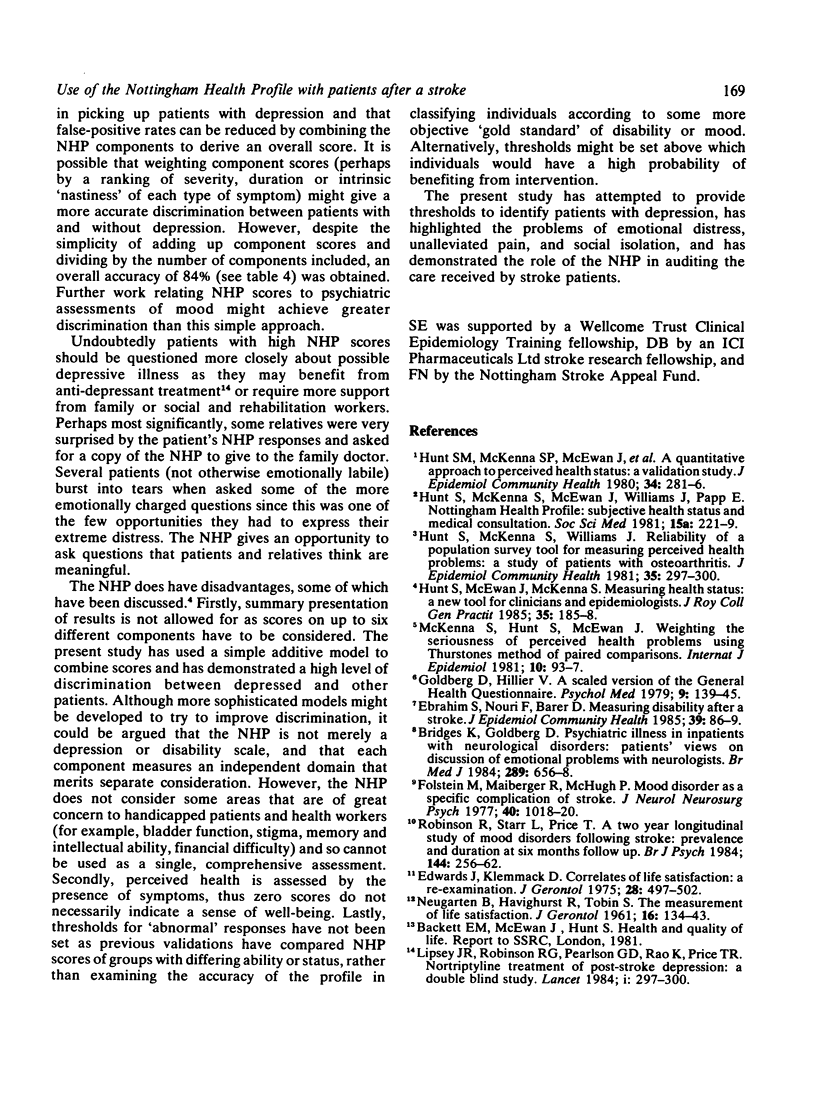Abstract
The Nottingham Health Profile (NHP) is easy to use with stroke patients and may be used with those who cannot manage more complicated mood questionnaires, such as the General Health Questionnaire (GHQ). Stroke patients rate their health, and especially emotions and feelings of social isolation, as much worse than that of people of similar age. NHP emotion scores correlate with objective measures of disability, length of hospital stay, and GHQ scores. The NHP is a valid indicator of depressed mood, and combining its components into a total score gives the greatest accuracy in detecting depression. Patients with high scores at one month continued to report large numbers of problems at six months after their stroke. Many patients experienced pain, disturbed sleep, and social isolation, which are important, potentially treatable problems not usually considered in the management of stroke patients. Many patients with problems did not see their general practitioner or any other source of help, and additional follow up was needed.
Full text
PDF



Selected References
These references are in PubMed. This may not be the complete list of references from this article.
- Bridges K. W., Goldberg D. P. Psychiatric illness in inpatients with neurological disorders: patients' views on discussion of emotional problems with neurologists. Br Med J (Clin Res Ed) 1984 Sep 15;289(6446):656–658. doi: 10.1136/bmj.289.6446.656. [DOI] [PMC free article] [PubMed] [Google Scholar]
- Edwards J. N., Klemmack D. L. Correlates of life satisfaction: a re-examination. J Gerontol. 1973 Oct;28(4):499–502. [PubMed] [Google Scholar]
- Folstein M. F., Maiberger R., McHugh P. R. Mood disorder as a specific complication of stroke. J Neurol Neurosurg Psychiatry. 1977 Oct;40(10):1018–1020. doi: 10.1136/jnnp.40.10.1018. [DOI] [PMC free article] [PubMed] [Google Scholar]
- Goldberg D. P., Hillier V. F. A scaled version of the General Health Questionnaire. Psychol Med. 1979 Feb;9(1):139–145. doi: 10.1017/s0033291700021644. [DOI] [PubMed] [Google Scholar]
- Hunt S. M., McEwen J., McKenna S. P. Measuring health status: a new tool for clinicians and epidemiologists. J R Coll Gen Pract. 1985 Apr;35(273):185–188. [PMC free article] [PubMed] [Google Scholar]
- Hunt S. M., McKenna S. P., McEwen J., Backett E. M., Williams J., Papp E. A quantitative approach to perceived health status: a validation study. J Epidemiol Community Health. 1980 Dec;34(4):281–286. doi: 10.1136/jech.34.4.281. [DOI] [PMC free article] [PubMed] [Google Scholar]
- Hunt S. M., McKenna S. P., McEwen J., Williams J., Papp E. The Nottingham Health Profile: subjective health status and medical consultations. Soc Sci Med A. 1981 May;15(3 Pt 1):221–229. doi: 10.1016/0271-7123(81)90005-5. [DOI] [PubMed] [Google Scholar]
- Hunt S. M., McKenna S. P., Williams J. Reliability of a population survey tool for measuring perceived health problems: a study of patients with osteoarthrosis. J Epidemiol Community Health. 1981 Dec;35(4):297–300. doi: 10.1136/jech.35.4.297. [DOI] [PMC free article] [PubMed] [Google Scholar]
- Lipsey J. R., Robinson R. G., Pearlson G. D., Rao K., Price T. R. Nortriptyline treatment of post-stroke depression: a double-blind study. Lancet. 1984 Feb 11;1(8372):297–300. doi: 10.1016/s0140-6736(84)90356-8. [DOI] [PubMed] [Google Scholar]
- McKenna S. P., Hunt S. M., McEwen J. Weighting the seriousness of perceived health problems using Thurstone's method of paired comparisons. Int J Epidemiol. 1981 Mar;10(1):93–97. doi: 10.1093/ije/10.1.93. [DOI] [PubMed] [Google Scholar]
- NEUGARTEN B. L., HAVIGHURST R. J., TOBIN S. S. The measurement of life satisfaction. J Gerontol. 1961 Apr;16:134–143. doi: 10.1093/geronj/16.2.134. [DOI] [PubMed] [Google Scholar]
- Robinson R. G., Starr L. B., Price T. R. A two year longitudinal study of mood disorders following stroke. Prevalence and duration at six months follow-up. Br J Psychiatry. 1984 Mar;144:256–262. doi: 10.1192/bjp.144.3.256. [DOI] [PubMed] [Google Scholar]


